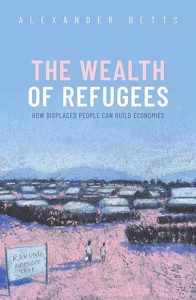The Wealth of Refugees: How Displaced People Can Build Economies

Author: Alexander Betts
Publisher: Oxford University Press
Year of Publication: 2021
Print Length: 448 pages
Genre: Non-Fiction / Migration & Refugee Studies, Development Studies
Area: Africa, Dollo Ado Refugee Camp, Kakuma Refugee Camp, Kalobeyei Refugee Camp, Kenya, Uganda, Ethiopia
Other Focus: Syrian, Venezuelan
Topic: Asylum & Refugee System, Refugees & Forced Migration, Refugees’ Roles & Self-Reliance, Refugee Economies, Refugee Livelihoods, Refugee Management/Governance, Refugee-Led Organisations & Networks, Responses to Refugees, Refugee Urban Settlement, Protracted Refugee Situations, Borders, Camps, Urbanization, City & Urban, Challenges & Opportunities, Future Scenarios, Host Community, Community Development, Social Cohesion, Sustainability, Development, Dignity; Self-Determination, Autonomy, Agency; Economy, Market, The Right to Work, Freedom to Move and to Stay, Movement of People and Ideas, Humanitarian Action & Humanitarianism, Policy & Practice, Politics & Power, Private Sector, Protection, Safety, Ethics & Morality, Fundamental Rights and Liberties, Human Rights, Pandemic Covid-19
We live in an age of displacement. Refugee numbers are increasing due to a proliferation of fragile states, and this problem will be exacerbated by climate change and the impact of COVID-19. And yet, rising populist nationalism has undermined the political willingness of rich countries to accept migrants and asylum seekers. Given these contradictory trends, how can we create sustainable refugee policies that enable displaced people to live in safety and dignity, while operating at scale?
The Wealth of Refugees draws upon a decade of original qualitative and quantitative research to offer practical solutions. Focusing on refugees in camps and cities in Africa, it identifies approaches that can be effective in improving the welfare of refugees, increasing social cohesion between refugees and host communities, and reducing the need for onward migration. The book argues that the key lies in unlocking the potential contributions of refugees themselves. Refugees bring skills, talents, and aspirations and can be a benefit rather than a burden to receiving societies. Realizing this potential relies upon moving beyond a purely humanitarian focus to fully include refugees in host-country economies, build economic opportunities in refugee-hosting regions, and navigate the ambiguous politics of refugee protection.
Table of Contents
Acknowledgements
List of Figures and Tables
Map of Main Research Sites
1. Introduction
PART I: ETHICS—WHAT IS RIGHT?
2. The Search for Sustainability
PART II: ECONOMICS—WHAT WORKS?
3. Refugee Economies
4. The Limits of Urbanization
5. Uganda: The Right to Work and Freedom of Movement
6. Kalobeyei: A Market-Based Settlement Model
7. Dollo Ado: The Private Sector and Border Development
PART III: POLITICS—WHAT PERSUADES?
8. The Politics of Refugee Rights
9. Uganda: A Political History of Refugee Self-Reliance
10. Kenya: How Turkana County Turned Refugees Into An Asset
11. Ethiopia: Conditionality and the Right to Work
PART IV: POLICY—WHAT NEXT?
12. Building Borderland Economies
13. Beyond Africa: The Syrian and Venezuelan Refugee Crises
14. Refugees, COVID-19, and Future Trends
15. Conclusion
Endnotes
Index

Alexander Betts is Professor of Forced Migration and International Affairs, William Golding Senior Fellow in Politics at Brasenose College, University of Oxford. His research focuses on the political economy of refugee protection. He is particularly interested in refugees’ access to socio-economic rights and opportunities, and he has undertaken research across Africa and Europe, and also works on broader themes relating to the politics of migration and humanitarianism. He is author of 12 books and around 100 scholarly publications. His most recent book is The Wealth of Refugees: How Displaced People Can Build Economies (Oxford University Press, 2021), which was awarded the International Studies Association’s ‘Ethnicity, Nationalism, and Migration’ section Distinguished Book Award for 2022. His other books include Refuge: Transforming a Broken Refugee System (Penguin Allen Lane, 2017 with Paul Collier), which was named by the Economist among the ‘best books of 2017’ and The Global Governed? Refugees as Providers of Social Protection (Cambridge University Press, 2020, with Kate Pincock and Evan Easton-Calabria). He leads the IKEA Foundation-funded Refugee Economies Programme, which undertakes participatory research on the economic lives of refugees in Uganda, Kenya, and Ethiopia, and has created one of the first multi-country data sets focusing on the economic lives of refugees and host communities.
Source: https://www.rsc.ox.ac.uk/people/alexander-betts
More from Alexander Betts in this library, click here.
